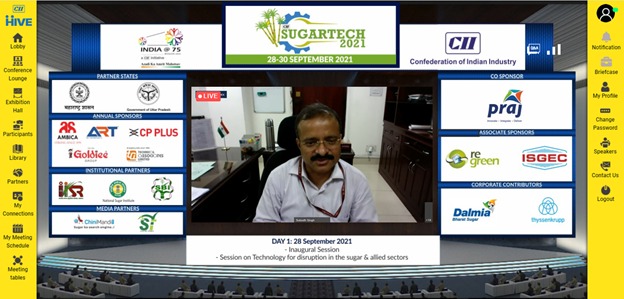Shri Sanjay Bhoosreddy, Additional Chief Secretary, Sugar & Excise Department & Cane Commissioner, Govt of Uttar Pradesh inaugurated the 8th edition of CII Sugartech which was held virtually today. The three-day CII Sugartech Summit is expected to witness participation from various stakeholders of the sugar & allied industry.
In his address, Mr. Bhoosreddy said that the state’s mills have developed in the last 4 years to produce 138 crore litres of ethanol. He also emphasized on the ways of increasing cane farmers income, improving livelihood and providing more opportunities to the farmers. He mentioned about the modifications made in the Sugar Policy 2018 which primarily focuses on increasing expenditure on cane farming, reducing the overall cost of growing cane and diversification of the by-products apart from sugar production. Speaking on the infrastructure side, he mentioned that UP & Maharashtra together have more than 250 sugar mills and more than 60 lakh farmers associated with the mills. However, there is an immense need of complimenting the physical infrastructure with that of technological infrastructure. He mentioned that 95% of the cane farmers have started using the Smart Ganna Kisan application which keeps them abreast with the various updates about the sugarcane agriculture such as when & how they have to start planting, harvesting and when they have to reach the mill gate etc. Shri Bhoosreddy also mentioned about the technology in farm mechanization which he referred to as Panchamrit program which includes five key techniques such as trench cultivation, use of drip irrigation, intercropping, distribution of high-yielding varieties etc.

Speaking at the summit, Shri Subodh Kumar Singh, Joint Secretary, Ministry of Consumer Affairs, Food & public Distribution, Government of India emphasized on the importance of the sector which involves more than a crore farmers and five lakh people in the mills. He iterated on the need for long-term infrastructural reforms in the sugar industry so that the price of sugar can be proportionate to the price of the raw material. He mentioned that India currently is a sugar surplus producing country & in the last three years more than 150 lakh tonnes of sugar has been exported. The diversion of sugar towards ethanol has also been consistently increased to reach almost 10 lakh tonnes this year which is planned to increase to 35 lakh tonnes in 2022. The GOI is working towards reduction of the opening balance of sugar to 70 lakh tonne by October 2022. Prompt payment by the OMCs to the sugar mills has resulted in timely payout to the farmers. He urged the sugar mills to have integrated plants with distilleries so that they can produce B Heavy molasses instead of C Heavy molasses. Also, potash manufacturing which is currently imported in the country. Mr Singh advised the sugar mills to diversify their business portfolio for maximum utilization of by-products & enhancing their profitability.
Mr.Shekhar Gaikwad, Sugar Commissioner, Government of Maharashtra shared that 90% of the FRP has been paid by the 190 mills that crushed cane in the last season. The state aims to produce 200 crore litres of ethanol this year to support the Ethanol Blending Program. The southern Maharshtra region enjoys a high recovery rate of around 13 hence focus on sugar production whereas the others with lower recovery have started focusing on B molasses, sugar juice etc. Maharashtra leads the country in terms of sugar exports owing to its proximity to the port. The Maharashtra sugar commissionerate has introduced a transparent color coded tagging in the public domain for the mills based on their payment status to the farmers so that they can choose which mill would they provide their supply to. The mills have diversified to produce 40 lakh litres of sanitizers, fertilizers and other eco-friendly products. They are also working with the Japan government to develop smaller harvesting machines based on the state’s landholdings. Another breakthrough move is that of Bio fuel based tractors in the fields.

Mr.Tarun Sawhney, Co-Chairman, CII Task Force on Bio-Energy and; Vice Chairman & Managing Director, Triveni Engineering & Industries Limited emphasized on the need to develop high-sucrose varieties such as CO 0238. He also iterated that adoption of water-saving techniques such as drip & spray irrigation in cane farming have become need of the hour for maintaining water balance across the country. Mr.Sawhney mentioned that there is a need for the governments and industry to work in partnership to reduce the overuse of pesticides in the cane farms.
Mr.Roshan Lal Tamak, Conference Chairman and Executive Director & CEO – Sugar, DCM Shriram Ltd shared that the Indian sugar industry, which is supplying 300 lakh litres of ethanol each year is slowly evolving from a sugar manufacturing sector to one of clean bio-energy.
The first day of the Summit saw active participation of more than 300 participants on CII’s virtual platform Hive. The discussions on the second day shall focus on Ethanol blending in India and the Impact of Research, Mechanization & Agtech in sustainable cultivation. There is also a Knowledge sharing session for the cane farmers to update them with the latest developments in cane varieties as well as the business opportunities that they can explore.
The session, scheduled on 30th Sept from 4-5pm shall be live streamed on Youtube for maximum outreach to the cane growers: https://youtu.be/KzDm0M-hG5Y












